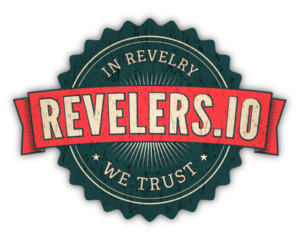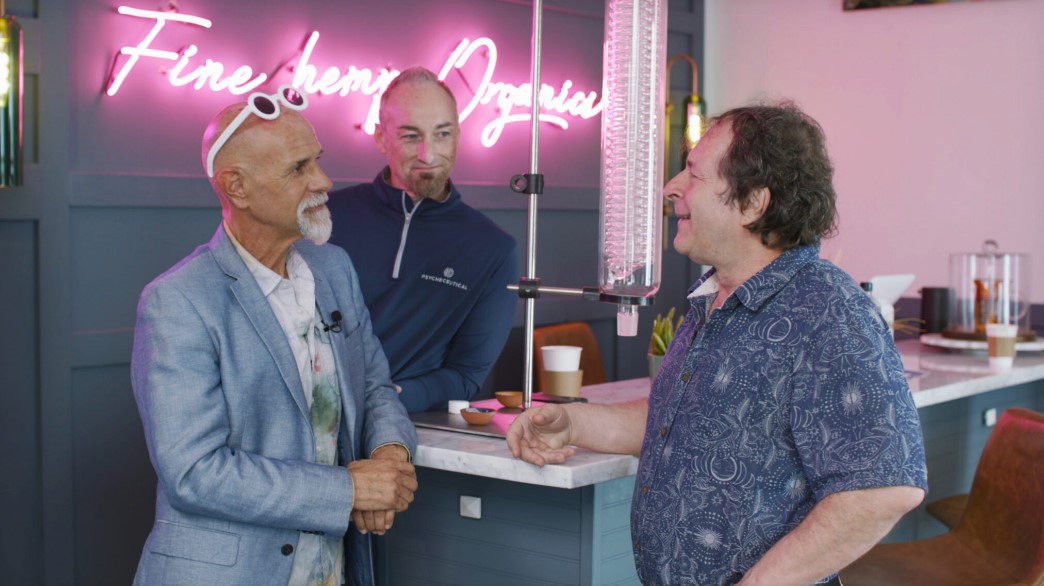Photo MAPS Founder Rick Doblin visits Psycheceutical’s Chief Visionary Officer Mike ‘Zappy’ Zapolin, CEO Chad Harman at the company’s lab and tests NeuroDirect™ Ketamine.
Psycheceutical Bioscience (BWVI) Develops Non-Psychoactive Ketamine Topical for PTSD and Depression.
Published by Rowan Dunne 5-15-2023
Psychedelics can be efficacious for treating a variety of mental and physical health conditions but the long trip often associated with their use, side effects and need for a monitored environment has inspired certain companies to seek alternatives.
Psycheceutical Bioscience Inc (OTC: BWVI) has developed a ketamine topical that provides therapeutic benefits of the psychedelic without complications from the drug’s psychoactive effects when administered in other ways. The topical is also much more affordable than ketamine infusions and visits to the clinic, costing about US$120 for a month’s supply that can be simply applied to the back of the neck at home without supervision.
RELATED: Adding Psycheceutical Bioscience (BWVI) $0.14 to Watch List. Ketamine.
Psycheceutical’s Chief Visionary Officer Zappy Zapolin said in an interview with Mugglehead on Tuesday that the Founder of the prominent psychedelics research organization MAPS, Rick Doblin, recently tried the product at the company’s lab and was very enthusiastic about it.
“Rick told me ‘I just got a US$25 million grant from the government for studying the impact of cannabis on Veterans with PTSD and I think your NeuroDirect™ Ketamine would be better for those Veterans than the cannabis would’ and what a testimonial that is,” said Zapolin.
Doblin said that in his 40 years working in the field of psychedelics it was rare coming across a unique product being developed like this that can provide the benefits of a psychedelic without the negative side effects or trip.
Drug ‘revolutionizes’ ketamine treatment, says Psycheceutical’s clinical advisor
A recent study on the topical by Psycheceutical’s clinical advisor Dr. Ronald Aung-Din published in Drug Development & Delivery yielded an 80 per cent efficacy rate for the treatment of post-traumatic stress disorder (PTSD) and associated depression and anxiety. The study involved 100 participants and was held at a neurology and neuropsychiatry practice.
Psychedelics have been a topic of conversation among medical researchers because of their properties for treating mental health disorders. However, some researchers like Aung-Din doubt the healing potential of psychoactive effects and believe they are more of an inconvenience in a clinical sense that can cause more problems than benefits.
Aung-Din spoke about the negative aspects associated with different methods of administering ketamine and other psychedelics in an interview with Mugglehead.
“The IV clinics and ketamine nasal spray clinics have a risk evaluation mitigation strategy so that patients can’t just do this at home, they have to go to a specified centre, have their vital signs and side effects monitored for a couple of hours and cannot drive back,” said Aung-Din.
“Our drug can be used at home, it revolutionizes ketamine treatment and potentially LSD, psilocybin and whatever else you want to consider,” he added.
Psycheceutical wants to raise enough money to develop topical formulations with those psychedelics as well.
The company plans on doing crowdfunding next month and is currently working toward qualifying for listing on the Nasdaq Exchange.
It is also currently developing drugs for the treatment of traumatic brain injury and announced earlier this month that it had raised US$1.3 million from Cantheon Capital for in-human trials in Australia with NeuroDirect™ Ketamine.
Zapolin and Aung-Din say NeuroDirect Ketamine is quite effective at helping to alleviate headaches and migraines as well.
Psycheceutical shares dropped by 3.25 per cent on Wednesday to US$0.14 on the OTC Markets.
Other researchers value ‘the trip.’
However, some researchers believe the trip involved with classical methods of psychedelic administration can be necessary for healing purposes.
A study at the end of 2020 published by the American Chemical Society concluded that the subjective experiences people had from taking psychedelic medicines were necessary for lasting beneficial effects in their lives.
Another study in the fall of 2019 from the University of California, Berkeley found that psychedelic trip experiences from compounds like psilocybin can positively disrupt negative thought patterns and habitual tendencies among users.
North American companies have a keen interest in non-psychoactive medicines
Other companies have been developing psychoplastogen and psychedelic-inspired drugs that have the therapeutic benefits of psychedelics and promote neuroplasticity in the brain without any sort of trip or psychoactive effects.
Delix Therapeutics, a neuroscience company based in Boston Massachusetts, recently received approval to conduct a study on its DLX-001 psychoplastogen compound with 100 participants at the Center for Human Drug Research in the Netherlands.
In April this year, Toronto’s Mindset Pharma Inc.(CSE: MSET) (FSE: 9DF) (OTCQB: MSSTF) filed patent applications for its series of non-psychoactive psychedelic-inspired tryptamine compounds intended to treat neuropsychiatric and neurological disorders.
$BWVI, #BWVI












